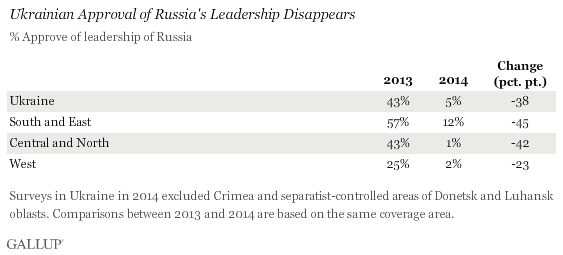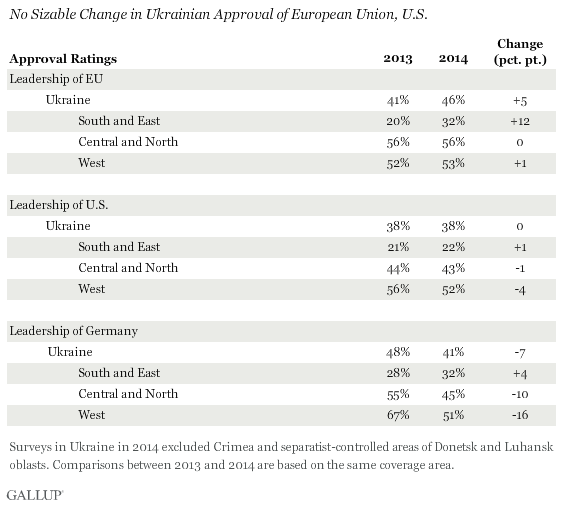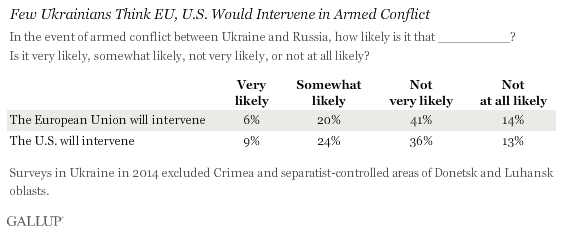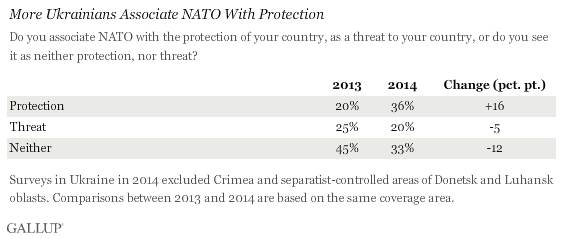by Julie Ray and Neli Esipova
Story Highlights
- Approval of Russia’s leadership drops from 43% to 5%
- Approval of EU, U.S. leadership remains flat
- Few think EU, U.S. would help in conflict with Russia
This article is the first in a weeklong series focusing on the most recent public opinion research data available from Ukraine.
WASHINGTON, D.C. — Any kinship Ukrainians used to feel with Moscow’s leadership is gone after Russia’s annexation of Ukraine’s Crimea region in March. Just 5% of Ukrainians interviewed this fall say they approve of Russia’s leadership, down almost 90% from the approval rating of 43% the year before.

Gallup’s interviews in Ukraine this year took place in September and October following a ceasefire between the Ukrainian government and pro-Russian separatists in the country’s East. Gallup’s polls in 2014 excluded the Crimea region, which is currently considered occupied territory, and some areas of the Donetsk and Luhansk regions where security was an issue. The excluded areas account for approximately 10% to 13% of Ukraine’s adult population. Comparisons between the 2013 and 2014 data are based on the same survey coverage areas.
The drastic change in approval is not that surprising given Russia’s backing of pro-Russian separatists and its gas dispute with Ukraine, but it marks a full divorce from Ukrainians’ generally high approval ratings of Russian leadership over the past decade. Importantly, ratings have declined sharply across all of Ukraine — including the country’s typically more Russian-leaning South and East, where 57% approved in 2013 and 12% approve today. In Ukraine’s Central and North and Western regions, current approval is 1% and 2%, respectively.
No Change in Views of U.S., European Union
At the same time that Ukrainians have spurned Russia, they have not fully embraced the West — which has largely sided with them in the conflict. While Ukrainians are more likely to approve of the leadership of the European Union and the U.S. than they are of Russia, their views have not changed significantly over the past year. Further, Ukrainians’ views of leadership of Germany, which has been on the front lines of the conflict between the EU and Russia over Ukraine, have actually soured somewhat.

While the EU, the U.S. and Germany have backed economic sanctions against Russia over its continued support of pro-Russian separatists, Ukrainians’ lackluster approval of Western leaders may reflect the feeling that Western support only goes so far. The majority of Ukrainians (55%) think it is unlikely that the EU would intervene in the event of armed conflict between Ukraine and Russia, and about half (49%) think it is unlikely that the U.S. would get involved.

Echoing this sense of vulnerability, Ukrainians are somewhat warmer toward NATO than they have been in the past when they, like residents of many other former Soviet countries, were more likely to see NATO as a threat. As controversy swirls over Ukraine’s potential bid to join the alliance, 36% of Ukrainians today view the organization as protection and 20% view it as a threat. Even in the Russian-leaning South and East, 2014 data shows an increase in the percentage of Ukrainians who have come to view NATO as providing protection — although more are still likely to see it as a threat.

Bottom Line
Ukrainians’ hard feelings toward Russia’s leadership are not wholly unexpected, given its alleged actions in Ukraine, and that the situation in the East is still far from being resolved. That Ukrainians’ views of Western leadership have not improved is more surprising — but it suggests that many Ukrainians still feel they are on their own, despite the West’s tough talk and economic sanctions against Russia. This is evident in their belief they would be alone if the conflict between Russia and Ukraine ever became an armed one.
Survey Methods
Results are based on face-to-face interviews with 1,000 adults, aged 15 and older, conducted Sept. 11-Oct. 17, 2014, in Ukraine. For results based on the total sample of national adults, the margin of sampling error is ±3.8 percentage points at the 95% confidence level. All reported margins of sampling error include computed design effects for weighting.
Gallup’s polls in Ukraine in 2014 excluded the Crimea region, which is currently considered occupied territory, and some areas of the Donetsk and Luhansk oblasts where security was an issue. The excluded areas account for approximately 10% to 13% of Ukraine’s adult population.
Continued at http://www.gallup.com/poll/180110/ukrainian-approval-russia-leadership-dives-almost.aspx
Filed under: Information operations
 by
by 







 Last night I published what turned out to be an erroneous report and I am now publishing a public
Last night I published what turned out to be an erroneous report and I am now publishing a public 



 Dmitry Tymchuk, Head of the Center for Military and Political Research, Coordinator of the
Dmitry Tymchuk, Head of the Center for Military and Political Research, Coordinator of the 

 Symantec
Symantec 
 Information about protests in Russia is being suppressed by the Russian censorship body, Roskomnadzor, in an attempt to squelch opposition in Russia.
Information about protests in Russia is being suppressed by the Russian censorship body, Roskomnadzor, in an attempt to squelch opposition in Russia.
 Screenshot of the material Roskomnadzor is threatening to block the site over, although it only reports plans to hold a protest
Screenshot of the material Roskomnadzor is threatening to block the site over, although it only reports plans to hold a protest